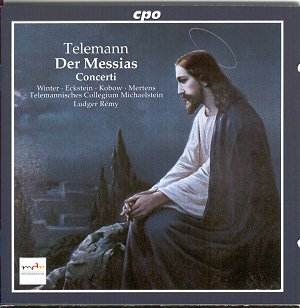The
main work on this Telemann release, the oratorio Messiah,
shares the same name and subject as Handelís crowning masterpiece
but is very different in quality and effect. Based on a script
that Charles Jennens had prepared from the scriptures, Handel
wrote his oratorio Messiah in 1742 and the work has retained
its supreme popularity for over 250 years whilst this Telemann
work has remained virtually unknown and is receiving on this CPO
release its first commercial recording. Telemannís Messiah
was composed in the 1750s which was some years later than his
contemporary and fellow-countrymanís work. It uses texts from
the first and tenth cantos of Friedrich Gottlieb Klopstockís epic
poem ĎMessiahí.
Handelís
Messiah is a massive and powerful work often performed
with a large chorus and orchestra with brilliant writing for the
chorus and the soloists and expressive recitatives. By contrast
Telemannís oratorio calls for lighter forces and has no traditional
arias and recitatives.
There
is sometimes good reason why a work from an esteemed composer
who is increasingly popular on record has remained in such obscurity
and with Telemannís Messiah the evidence points to his
frequent lapses of distinction and a watering down of ideas most
likely owing to his compositional alacrity and prolific facility.
I found the work, although very well performed by all concerned,
principally lacking in positive impact and dramatic action, having
little imagination with even less memorability and rather disappointing
overall. At just over thirty minutes duration the score could
not be considered as particularly lengthy, yet on each of the
four occasions that I listened to the recording my concentration
soon began to wander. In spite of valiant attempts by the soloists
I found the whole affair rather soporific.
It
is a shame that I was not able to hear this impeccable German
quartet of soloists in better quality repertoire. The soprano
Veronika Winter and the tenor Jan Kobow are both very fine performers
and although I was hearing them for the first time, on this evidence,
the bass Klaus Mertens and contralto Marion Eckstein are singers
out of the top-drawer.
Klaus
Mertens has a strikingly expressive and wonderfully rich bass,
heard to great effect in In vain Satan rose up (track 2)
and in God himself come down from heaven (track 6),
Telemann instructs Ďmagnificentlyí and Mertens has no difficulty
providing it. In But, o deed known only to God in his omnipresence
(track 4) the contralto Marion Eckstein is in great voice, exquisitely
offering a refinement of vocal delivery and admirable articulation.
Eminent
conductor Ludger Remy is most experienced in this late-baroque
repertoire and has recorded several Telemann discs of sacred choral
works for the CPO label. One cannot fail to be impressed by Remy
and his excellent period instrument specialists Telemannisches
Collegium Michaelstein. Telemann for his Messiah has reduced
down his instrumental and vocal tools to a minimum and Remy and
this ensemble provide a luminous interdependence between each
of the instrumental voices.
I
always feel that the best of Telemann is heard in his chamber
compositions. His fertility extended across a wide range of instrumental
combinations and the three short works selected are good examples
of his expertise in this intimate medium.
Unfortunately
the generally fine performances are marred owing to the first
and third slow movements of the Partie in A minor, where
some strange sounds from the flutes and oboes made me cringe;
surely instruments cannot sound this bad. I am puzzled why sounds
as poor as these werenít detected at the recording session and
re-taken or maybe there was a technical fault with the recording
equipment. Itís all very odd!
The
sound quality of The Messiah is excellent but not
so with regard to the instrumental works where the sound blurs
noticeably at the edges. The booklet notes are informative but
rather technical and not always easy to read, maybe something
has been lost in the translation!
Another
recording from CPO as part of their acclaimed cycle of Telemannís
sacred choral works but a release which is best avoided. The
Messiah does not show Telemann at his best and there are
some strange sounds on one of the instrumental works.
Michael
Cookson

